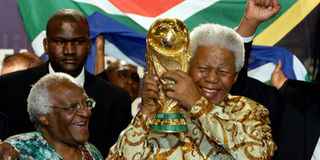Mandela: Gone but not forgotten

Madiba isn’t only remembered as a legendary revolutionist but also as a man who united the apartheid-stricken South Africa through sports like soccer and rugby. FILE PHOTO
LEGACY.
Few sights in modern South Africa stand out as the iconic images of Madiba in a Springboks shirt at the 1995 Rugby World Cup final in Johannesburg. Its only 20 years ago but back then it wasn’t that obvious for a black man to be welcome at a rugby game.
It’s been a year since Nelson Mandela’s candle finally burnt out as silently as he probably would have wanted it to. Down here in South Africa he has not and will probably never be forgotten.
Television channels continue to run commemoration documentaries and movies that extol his life.
Yet as millions, the world over, remember his life and continue to drink from the well of superlatives that describe his deeds and sacrifices, I feel not enough is mentioned of his uncanny ability to use sports as a unifying factor.
For Mandela behind all that statesmanship and diplomatic splendour was a man, who believed in the uncomplicated potency of sports as a unifying tool.
A former boxer in his own right, Madiba must have learnt at an early age that apart from a general sense of purpose and discipline, sports can instlil in us a comradeship. And it was something he was to milk to the maximum after he came to power in 1994.
Few sights in modern South Africa stand out as the iconic images of Madiba in a Springboks shirt at the 1995 Rugby World Cup final in Johannesburg. Its only 20 years ago but back then it wasn’t that obvious for a black man to be welcome at a rugby game let alone cheer a predominantly white team.
But there they were, black and white, dancing all led by Nelson Mandela doing that somewhat off-rhythm-fists-clenched shuffle of his. Africa Cup of Nations was to follow a year later in 1996 and when it came 14 years later Africa’s first World Cup, had Madiba’s star dust sprinkled all over it.
His mind was probably gone by then but a golf cart brought him to the closing ceremony and a simple wave almost brought the house down. The adulation wasn’t the kind reserved for today’s vanity celebrities but for a man who personified the grace that rest of humanity only aspires too.
What a shame then that unlike Madiba not many African leaders, including his successor Jacob Zuma appreciate how sports can be used to bring together a people divided by prejudices. History is not short of the powerful examples of unity through sports. Still many consider sports as a nonsensical distraction from the more important matters of nation building.
And even if you were to move closer home, we may not be a nation weighed down by apartheid but it could be said we are disjointed in many ways.
Nonetheless, you all must have noticed how all our disagreements seem to fall away when The Cranes are beating someone at Namboole or Steven Kiprotich is leaving everyone in his trail? Yes, that’s the power of sports and soon or later, we are going to have to milk it.
We should neither look at sports as a pass-time for hedonistic types nor underestimate its powers to bond people and build nations. Madiba knew this and he showed us how. He demonstrated to us what can be achieved by forging a common purpose even if that is as simple as cheering sports men and women. He is now gone but I imagine he would expect all of us to heed the lessons. And what invaluable lessons they were. Rest in Peace, Madiba!
WHAT A SHAME!
What a shame then that unlike Madiba not many African leaders, including his successor Jacob Zuma appreciate how sports can be used to bring together a people divided by prejudices. History is not short of the powerful examples of unity through sports.
Still many consider sports as a nonsensical distraction from the more important matters of nation building. And even if you were to move closer home, we may not be a nation weighed down by apartheid but it could be said we are disjointed in many ways.




